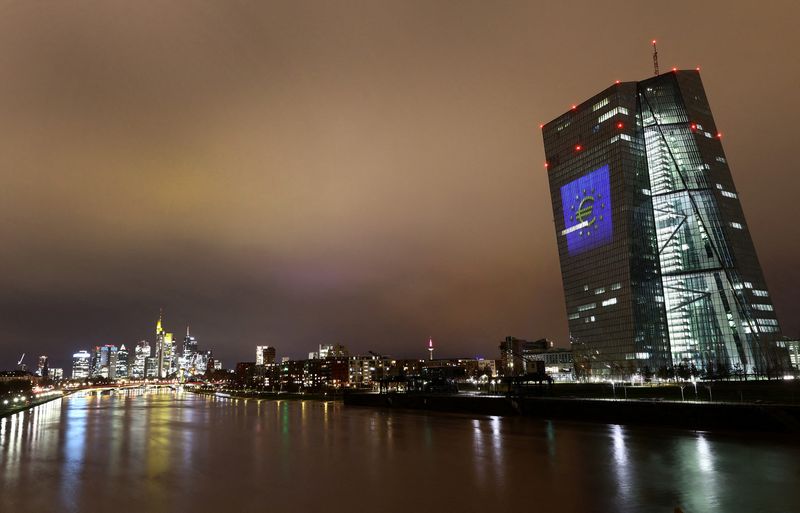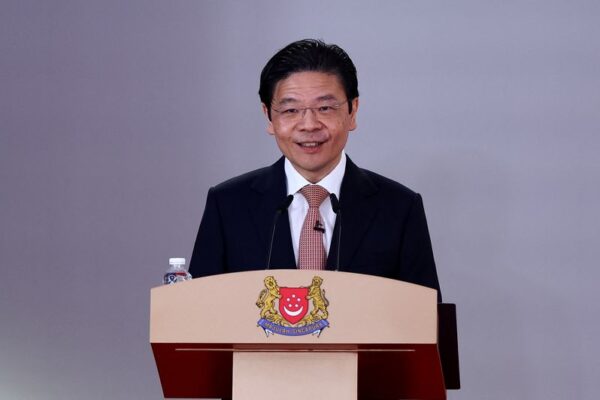ECB to wait until Q4 to raise rates despite rampant inflation: Reuters poll
© Reuters. FILE PHOTO: European Central Bank (ECB) headquarters building is seen during sunset in Frankfurt, Germany, January 5, 2022. REUTERS/Kai Pfaffenbach By Swathi Nair and Jonathan Cable
BENGALURU/LONDON (Reuters) – The European Central Bank will wait until the last months of this year for its first interest rate rise in over a decade, with fewer economists in a Reuters poll taken after Russia’s invasion of Ukraine now expecting an earlier move.
That consensus from a slight majority of forecasters, 27 of 45, polled March 1-4, comes despite news that inflation in the euro zone hit 5.8% in February, defying the central bank’s own expectations for a decline.
Only six economists expected the first hike to come sooner, in the third quarter, down from 16 in a poll last month.
Of the 33 of 45 respondents who expected the deposit rate to rise from a record low of -0.50% this year, 18 saw it at -0.25% at year-end, nine had it lower than that and six saw it higher.
That fragmented view underscores the central bank’s communications challenge at its March 10 policy meeting.
Indeed, expectations for ECB rates stand in stark contrast with other major central banks, which are likely to have delivered several hikes by year-end. The Bank of England has already lifted rates twice in its last two consecutive meetings.
Like those other economies, the euro zone has weathered the Omicron variant of the pandemic relatively well and is in full recovery mode. Euro zone unemployment is a record low. But its economy is more exposed to the armed conflict on the continent.
“The war hasn’t really changed the difficult combination of inflation and growth risks, it has only exacerbated it. Therefore, logically, it should not fundamentally change the ECB’s plans to cautiously and gradually withdraw some accommodative policies,” wrote Rabobank economists in a recent client note.
“What has changed is the near-term uncertainty. We believe this may tip the balance towards a short delay in the ECB’s normalisation timeline but – crucially – not a full stop.”
There was no strong consensus either on which month the ECB would end its Asset Purchase Programme (APP). The central bank is currently purchasing 20 billion euros worth of bonds a month and is set to carry on even after its pandemic-related separate programme ends in March.
These bond purchases are set to double in the second quarter. But nearly two-thirds of respondents said the APP would be shut by end-September, with nearly half saying in that month. All but one economist said it would be shut by end-year.
In the meantime, rising energy prices and further supply chain disruptions since the Russian invasion are likely to keep inflation higher for longer.
As the conflict in Ukraine intensified, and with the ECB unlikely to raise rates until later in the year, the euro fell below $1.10 for the first time since May 2020 on Friday, raising the prospect of additional imported inflation pressure.
“The war has clearly increased the risk of a stagflation scenario for the euro zone, where you will have a stagnating economy and much higher inflation on the back of high energy prices,” said Carsten Brzeski, global head of macro at ING.
“The worry is we might see a squeeze of the euro zone economy from both sides. On the supply side, it will impact production due to supply chain disruptions and on the demand side in the form of higher energy prices and lower purchasing power.”
Forecasts for inflation this year have risen for the ninth consecutive survey – up 0.3 and 0.6 percentage points for the first and second quarters to 5.4% and 5.3% respectively, more than double the ECB’s 2.0% target.
Economic growth in the bloc was expected to peak at 1.0% next quarter and then slow to 0.8% and 0.6% in the third and fourth quarters, respectively. This is a downgrade from 1.2%, 1.0% and 0.7% predicted just a few weeks ago.
On an annual basis, it was expected to grow 3.8% this year and 2.5% next, from 3.9% and 2.5% predicted last month.
(For other stories from the Reuters global economic poll:)












 Bitcoin
Bitcoin  Ethereum
Ethereum  Tether
Tether  XRP
XRP  USDC
USDC  Solana
Solana  TRON
TRON  Figure Heloc
Figure Heloc  Lido Staked Ether
Lido Staked Ether